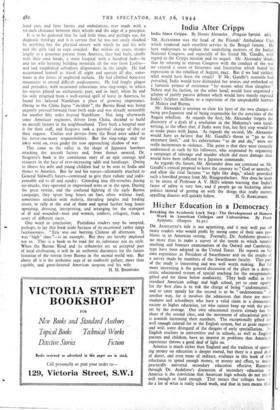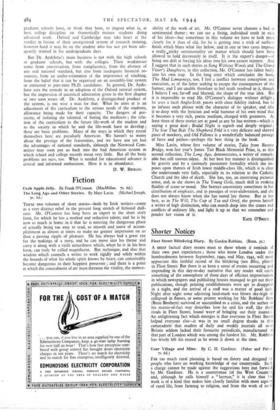.Fli2her Education in a Democracy
DR. AYDELOTTE'S title is not appetising, and it may well, put off many readers who would profit by seeing some of their own pro- blems in an American setting._ Formally, Dr. Aydelotte*omises no more than to 'make a survey of the • extent 'to which tutorial teaching and honours examinations of the Oxford and Cambridge type have been adopted in the United States. He reports on his own experience 'as President of Swarthmore and on the results of a survey made by members of the Swarthmore faculty. This part of the study is interesting and was well worth making. But far more interesting is the general discussion of the place in a demo- cratic educational system of special, teaching lor the exceptionally gifted and for those below mediocrity. They both suffer, in the standard American college and high school, yet to cater openly for the first class is to risk the charge 'of being " undemocratic," and to cater 'openly for the second is to be " undemocratic" in another way, for it involves the admission that there are many students and schoolboys who have a valid claim in a democratic society to highet education, yet who cannot keep up with the pace set by the average. Our own educational system already has it' share of the second class, and the movement of educational polic is towards increasing their numbers. The exceptionally gifted are well enough catered for in the English system, but at great expense and with some disregard of the dangers of early specialisation. So English teachers in universities and in schools, as well as English parents and children, have an interest in problems that American experience throws a good deal of light on.
America is much richer than England and the tradition of spend- ing money on education is deeper. rooted, but there is a good deal of direct, and even more of indirect, evidence in this book of the reluctance to spend enough money, or money and effort. to make practically universal secondary education effective. 'Running through Dr. Aydelotte's discussion of secondary -education in America is the conviction that American high schools do not teach well enough or hard enough. That means that colleges have [3 do a lot of .what is really school work, and that in turn means chit
graduate schools have, or think they have, to impose what is, at best, college discipline on theoretically mature students doing advanced work. Oxford and Cambridge may take heart at the verdict in favour of their unorganised system of research training, however hard it may be on the student who has not yet been ade- quately trained in his undergraduate days.
But Dr. Aydelotte's main business is not with the high schools or graduate schools, but with the colleges. Their weaknesses come from conservatism, from complacency, from the absence of any real national standard, but also from inadequate financial re- sources, from an under-estimation of the importance of teaching, from the belief that it can be organised on an assembly-line system or entrusted to part-time Ph.D. candidates. In general, Dr. Ayde- lotte sees the remedy in an adoption of the Oxford tutorial system,. but the impression of uncritical admiration given in the first chapter or two soon wears off. Dr. Aydelotte, a distinguished product of the system, is too wise a man for that. What he aims at is an adjustment of the curriculum to the serious needs of the students, allowance being made for their capacity. The dangers of pre- cocity, of isolating the talented, of boring the mediocre ; the rela- tion of the curriculum to the future life-work of the student and to the society in which he and the life-work have to develop ; these are basic problems. Many of the ways in which they reveal themselves here are peculiarly American. We haven't to worry about the prestige of the fraternities, and we have not yet lost the advantages of national standards, although the Norwood Corn- mittee may soon put us back into the bad American system in which school and college records mean very little.. But all the basic problems are ours, too. What is needed for educational advance is critical and informed enthusiasm. Here it is in abundance.
D. W. BROGAN.



























 Previous page
Previous page